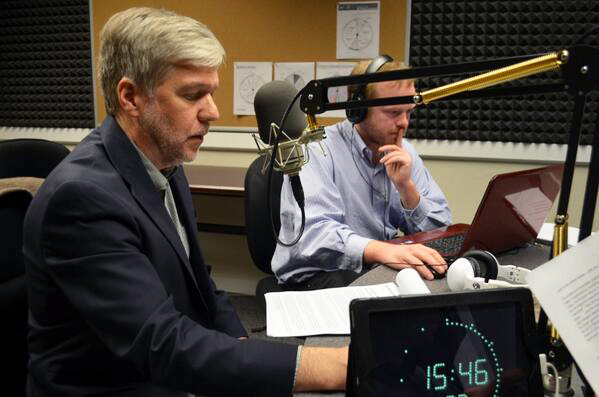
Photograph by Mark Hill
Over a 42-year broadcast career—40 of which were spent in Atlanta—WABE-FM Morning Edition host Denis O’Hayer has interviewed presidents, governors, congressmen, mayors, and civil rights icons. With memorable stints at WGST-AM/FM, WXIA-TV 11 Alive and, for the past decade at WABE-FM, O’Hayer’s reporting and reassuring voice have been a daily fixture as we idle in Atlanta’s endless traffic.
But beginning next week, for the first time in four decades, Atlantans will have to navigate the news cycle without O’Hayer’s treasure trove of Atlanta institutional knowledge.
After June 22’s Morning Edition on WABE-FM, O’Hayer will click off his microphone as he retires from daily reporting.
Listeners will still be able to catch O’Hayer, along with Democratic strategist Tharon Johnson and Republican strategist Brian Robinson on WABE’s biweekly Political Breakfast segments airing every other Friday at 7:20 a.m., with extended editions available on iTunes via the Political Breakfast podcast.

Photograph by Billy Howard
For most of us, the 2015 Atlanta Press Club Hall of Fame inductee is as ingrained into this city’s fabric as a Varsity Frosted Orange on a hot summer day and a jackknifed tractor trailer splayed in the middle of Spaghetti Junction at 5:01 p.m. on a Friday afternoon. However, O’Hayer’s original career path was decidedly very different (“I thought I wanted to be an actor,” he recalls with a laugh. “But I very quickly realized I was terrible.”).
In 1978, the Middlebury College graduate landed a job at Atlanta’s WGST-AM, just as it was switching to what would become its iconic all-news format.
O’Hayer stayed at WGST for 19 years, serving listeners in a variety of capacities, including facilitating and refereeing the station’s popular Counterpoint program with liberal columnist Tom Houck and conservative columnist Dick Williams (“I was the third person in the ring,” O’Hayer recalls. “Mostly, my job was to keep the conversation moving, shut up, and let good radio happen.”). He also hosted a weekend gardening show (“a subject about which I knew absolutely nothing”) and from 1991 to 1997, O’Hayer anchored WGST’s daily Sixty At Six news and interview program, where he first bonded with car-bound listeners idling on their way home from work.
O’Hayer then spent a decade on-air as a political and breaking news reporter for 11 Alive News before landing his current assignment at WABE-FM, Atlanta’s National Public Radio affiliate.
This month, during his final vacation break from his morning show duties, the veteran newsman sat down over coffee and scones at Alon’s in Virginia-Highland to reflect on four decades of reporting and the stories that had the deepest impact.
His 1985 spontaneous Ted Turner interview
I was coming out of Colony Square from an interview with actor John Houseman and I literally ran into Ted Turner, who was blowing through the door. I apologized and introduced myself, telling him I had been trying to get an interview with him. At the time, he was trying to buy CBS. I’ll never know what possessed him, but he said, “You got a few minutes right now?” And I’m thinking, “Are you kidding? Of course, I do.” He said, “Get in the car!” He was driving this little Toyota Tercel or something. I hopped in the car. I kept thinking, “What am I going to ask him?!” I hadn’t prepared anything. I was just hoping I had enough tape in my recorder. He was driving and I just started asking him any question I could think of. As luck would have it, he took the 14th Street bridge, where Turner Broadcasting was then located on the other side. The bridge was under construction. Traffic was completely stopped. But I kept firing questions at him. One of my questions got him so mad, he said, “Come here, I wanna tell you something!” So, in order to make his point, I follow him up to his office and he sat me down at his desk and lectured me, basically. Finally, his assistant Dee Woods came in and politely threw me out because Ted was running so drastically behind schedule, due to the traffic and the lecture he was giving me. His schedule was totally screwed at that point. But I ended up with a five-part series with Ted Turner on WGST. That taught me the importance of two things: the value of always being prepared for anything and sheer dumb luck.
His 1996 WGST interview with Olympic Park bombing suspect Richard Jewell
On July 27, 1996, security guard Richard Jewell discovered a backpack with three pipe bombs in Centennial Olympic Park during the Summer Games. He alerted police and helped evacuate the area before the bomb exploded. Initially hailed as a hero, the FBI later incorrectly named him as a suspect in the bombing. Jewell sued the AJC and other media outlets. Eventually serial bomber Eric Robert Rudolph pleaded guilty in the case.
If I had to pick the story that’s stuck with me over the years, it would be Richard Jewell. After the legal confrontation began, Richard and his attorney came on Sixty At Six with me. I talked to him live in studio for 30 minutes, at least. And you really got a feeling for what this man had been through and how devastating it had been. It’s open to debate whether he was in the right place at the wrong time or the wrong place at the right time. Years later, I was covering the sentencing of Eric Robert Rudolph, and Richard Jewell was there. Neither of us could get inside the courtroom. It was packed, so we were led to another courtroom set up with a screen so we could watch. I ended up sitting on one of the benches directly ahead of Richard. I turned around and talked to him. He remembered me. I knew when he left the courtroom there would be a pack of reporters waiting for him. But I just asked him how he was doing. I decided to leave him alone. It had to be an overwhelming moment for him. Watching him watch the sentencing of Eric Robert Rudolph was something I’ll never forget. I never saw him again.
Accidentally being on the scene during the 2005 Fulton County Courthouse shooting
On March 11, 2005, rape suspect Brian Nichols was on trial at the courthouse when he escaped from custody, grabbed a gun, and murdered Judge Rowland Barnes, court reporter Julie Ann Brandau, Sergeant Hoyt Teasley and later, ICE agent David Wilhelm.
This is the only story I ever took home with me. It was crossover day at the state capitol and I was outside downtown with 11 Alive cameraman Richard Crabbe. We were there for what we thought would be a very long day and night covering the legislature. We were coming up from the parking lot onto MLK, walking toward the capitol to our left. To our right, we heard five gunshots. We ran down the hill and when we got there, Hoyt Teasley was dying outside. We didn’t know the people inside had already been killed. All we knew was this poor man is dying in front of us. Richard had to shoot a 360-degree scene. You had the effort to save Teasley and behind us was the parking deck where Brian Nichols had run into. The officers were chasing him. And then there was the crowd control that was happening. It was total chaos. I spent the next 14 hours talking about it on air. I had to completely compartmentalize things. I can still see those people trying to save that poor man. I think about him and the others every March 11.

Photograph courtesy of WABE
Reporting live from the Kathryn Johnston Neal Street shooting in 2006
On November 21, 2006, Kathryn Johnston, a 92-year-old grandmother and a longtime Neal Street resident, was killed by 39 shots fired into her home by police using a no-knock warrant during a botched drug raid. Three Atlanta Police officers pleaded guilty and were sentenced to prison and APD’s drug unit underwent a complete overhaul.
In the pre-dawn hours, I was sent out to cover the shooting and as I got a look at the [knocked in] door, some kids from the neighborhood came up to us. It was the way they talked about her. The way they talked about her house. I knew there was something there. I knew I needed to listen to these kids. I called the newsroom and said, “Something isn’t adding up. There are missing pieces here.” Nobody else in the neighborhood would talk. They were petrified. Those kids were the key to that story. The lesson there for me was assume nothing, shut up, and just listen.
The 2010 WABE interview with Atlanta Public Schools Superintendent Beverly Hall
After a series of investigative reports were published in the AJC in 2009, a GBI investigation found 44 out of 56 APS schools cheated on the 2009 Criterion Referenced Competency Test (CRCT). At the time of O’Hayer’s interview, Hall was facing criminal charges, along with 35 APS educators. On April 1, 2015, 11 APS teachers were convicted on racketeering charges. A month earlier on March 2, 2015, before she could stand trial, Beverly Hall died of breast cancer at age 68.
The interview was in-studio and we were both from the northeast and at one point, she took the gloves off and it was on. The idea was not to attack her, of course, but on behalf of the listeners, there were some tough questions I had to ask. Basically, I had to say, “You’re claiming this, and I’m seeing this.” It got really intense. The sad thing is she passed away before we got to a conclusion on that story. It was the AJC’s work, of course, that brought us to that point. But she wasn’t talking to them. I don’t know this for certain, but it’s possible that either she or the people surrounding her thought that because WABE’s license is held by the board of education, she might find a friendlier audience with us. At one point, I had to say to her, “You’re the superintendent. Either you were in on it, you orchestrated it, or you didn’t know. Any way you look at it, this is bad.” There was no good answer there. I always felt the interview we aired would be the first chapter in what would be a series of her public responses. To my knowledge, it’s the only interview she ever did. Given what happened to those students and the lingering effects of that cheating scandal, it was one of the saddest stories I ever worked on.

Photograph courtesy of WABE
On being inducted into the Atlanta Press Club Hall of Fame in 2015
As you know, journalists love to give each other awards. I’ve been given award for saying, “Here’s so and so with a live report.” I don’t submit for awards these days. We’re all in this work together. But that one was different. I remember when I got the call, it felt like the floor had gone out from under me. I know the other names on that list—the Ted Turners, the Margaret Mitchells, and all of the giants at the AJC. Just the list of the folks who were inducted that year with me was astonishing. We’re talking about [Associated Press Georgia political reporter] Dick Pettys, [Civil rights pioneer and PBS and CNN reporter] Charlayne Hunter-Gault and [AJC managing editor and Pulitzer Prize winning author] Hank Klibanoff. When the person who called me told me who the other three were, I remember saying, “So, this is like that Sesame Street game, [one of these things is not like the others]?” If you were to describe my career in baseball terms, I’m the solid player batting sixth in the lineup who hits the line drive, and the singles and doubles, and has a reliably good batting average. Suddenly, I’m being mentioned in the same breath with the Babe Ruths of our industry. I belonged in the audience, not on the stage. I just remember feeling a profound sense of gratitude for all of the people who helped me and took a risk on me throughout my career. The people who opened a door for me and who taught me how to do this job right. I’m just a guy who’s had forty-plus years of tremendous luck, all while doing a job I’ve loved. I’m extremely grateful.













